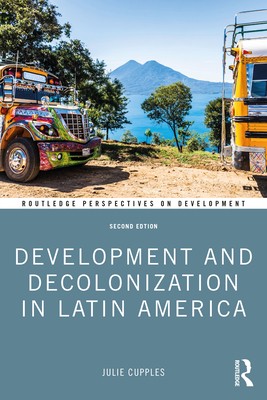
- We will send in 10–14 business days.
- Author: Julie Cupples
- Publisher: Routledge
- ISBN-10: 0367627086
- ISBN-13: 9780367627089
- Format: 15.6 x 23.4 x 1.9 cm, minkšti viršeliai
- Language: English
- SAVE -10% with code: EXTRA
Reviews
Description
Written in an accessible language, this book is a fully updated and revised edition of Latin American Development, a text that provides a comprehensive introduction to Latin American development in the twenty-first century and is anchored in decolonial theory and other critical approaches.
This new edition has been revised and updated in a way that takes into account recent changes in political leadership, the retreat of the Pink Tide, the Colombian peace accords, new forms of political and territorial mobilization, the intensification of extractivism, murders of environmental defenders, major disasters, and the new contours of feminist and anti-patriarchal struggles. It features new chapters on decolonial theory, Latin America in the world, disastrous development, Afrodescendant struggles, and the Latin American city. The book emphasizes political, economic, social, cultural, and environmental dimensions of development and considers key challenges facing the region and the diverse ways in which its people are responding, as well as providing analysis of the ways in which such challenges and responses can be theorized. It explores the region's historical trajectories, the implementation and rejection of the neoliberal model, and the role played by diverse social movements.
It is an indispensable resource for students and university lecturers and professors in development studies, Latin American studies, geography, anthropology, sociology, political science, economics, and cultural studies. In addition, it provides an invaluable introduction to the region for journalists and development practitioners.
EXTRA 10 % discount with code: EXTRA
The promotion ends in 21d.09:23:49
The discount code is valid when purchasing from 10 €. Discounts do not stack.
- Author: Julie Cupples
- Publisher: Routledge
- ISBN-10: 0367627086
- ISBN-13: 9780367627089
- Format: 15.6 x 23.4 x 1.9 cm, minkšti viršeliai
- Language: English English
Written in an accessible language, this book is a fully updated and revised edition of Latin American Development, a text that provides a comprehensive introduction to Latin American development in the twenty-first century and is anchored in decolonial theory and other critical approaches.
This new edition has been revised and updated in a way that takes into account recent changes in political leadership, the retreat of the Pink Tide, the Colombian peace accords, new forms of political and territorial mobilization, the intensification of extractivism, murders of environmental defenders, major disasters, and the new contours of feminist and anti-patriarchal struggles. It features new chapters on decolonial theory, Latin America in the world, disastrous development, Afrodescendant struggles, and the Latin American city. The book emphasizes political, economic, social, cultural, and environmental dimensions of development and considers key challenges facing the region and the diverse ways in which its people are responding, as well as providing analysis of the ways in which such challenges and responses can be theorized. It explores the region's historical trajectories, the implementation and rejection of the neoliberal model, and the role played by diverse social movements.
It is an indispensable resource for students and university lecturers and professors in development studies, Latin American studies, geography, anthropology, sociology, political science, economics, and cultural studies. In addition, it provides an invaluable introduction to the region for journalists and development practitioners.


Reviews